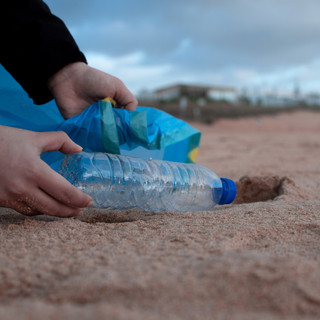
𝘛𝘩𝘦 𝘐𝘯𝘵𝘦𝘳𝘮𝘦𝘥𝘪𝘢𝘵𝘦 𝘎𝘶𝘪𝘥𝘦 𝘵𝘰 𝘗𝘭𝘢𝘴𝘵𝘪𝘤 𝘞𝘢𝘴𝘵𝘦
- Iana Bown

- Aug 17, 2022
- 5 min read
Updated: Sep 2, 2022
𝙒𝙝𝙖𝙩 𝙞𝙨 𝙋𝙡𝙖𝙨𝙩𝙞𝙘 𝙒𝙖𝙨𝙩𝙚?
𝘈 𝘎𝘶𝘪𝘥𝘦 𝘵𝘰 𝘗𝘭𝘢𝘴𝘵𝘪𝘤 𝘗𝘰𝘭𝘭𝘶𝘵𝘪𝘰𝘯
In this article we will discuss how we all can contribute in the fight against single use plastics and plastic waste as a whole. But first, what are single use plastics?
Single use plastics are plastic products that are only intended to be of use once.
Now this can mean a multiplicity of things, ranging from disposable items, to non-recyclable plastics, to the packaging encasing said items, which is technically speaking only of use once.
The term plastic waste refers to all of these items, plus a plethora of other categories and subcategories that fit under the very broad umbrella term.
Plastic waste is one of the leading causes of pollution on our planet and this waste is metaphorically choking our ecosystems.
Increasing plastic waste entails of many deadly effects including stormwater drain blockages, death of animals due to entanglement and digestion, and it even poses serious environmental danger to human health.
If we all don't work together to lower these rates and slow the curve, it is inevitable that our planet, our ecosystems/their inhabitants, and our species as a whole will drown in plastic waste.
𝙏𝙝𝙚 𝙀𝙛𝙛𝙚𝙘𝙩𝙨 𝙤𝙛 𝙋𝙡𝙖𝙨𝙩𝙞𝙘 𝙒𝙖𝙨𝙩𝙚
𝘚𝘦𝘢 𝘓𝘪𝘧𝘦
As mentioned above, plastic waste is the leading cause of many situations that would be considered disastrous on an ecological level. More so than anything, plastic waste is known as being very harmful to marine life and their ecosystems.
This is mainly due to the fact that a large majority of our waste/trash inevitably ends up in our oceans. Plastic waste is not only fatal to aquatic life and sea birds due to ingestion, but also entanglement.
This means not only are these animals suffering from ingesting toxic non-edible plastics, but they're drowning or dying from entrapment. This type of fate is unsuitable for any creature, and it is imperative that we do all that we can to save these animals from the very fate we're dooming them to.
𝙏𝙝𝙚 𝙀𝙛𝙛𝙚𝙘𝙩𝙨 𝙤𝙛 𝙋𝙡𝙖𝙨𝙩𝙞𝙘 𝙒𝙖𝙨𝙩𝙚
𝘖𝘶𝘳 𝘌𝘤𝘰𝘴𝘺𝘴𝘵𝘦𝘮𝘴
Plastic waste is also one of the main contributors to the very pollution that contaminates our soil, water sources, and air quality through the dissemination of harmful chemicals. It is proven that these harsh pollutants are harmful to all living creatures, including humans.
According to The Plastic Health Coalitions take on plastic waste and it's effects on human development, https://www.plastichealthcoalition.org , " A number of these chemicals have been associated with serious health problems such as hormone related cancers, infertility, and Neurodivergent disorders like ADHD and autism. "
Similarly, there are many negative effects that take place within animals and the many species that now inhabit dangerously polluted ecosystems.
Our ecosystems are being bombarded and polluted with plastic waste, thus negatively affecting all inhabitants of said ecosystem.
On every level ranging from ground pollution, to air pollution, to water pollution, and finally even even to the toxic pollutants that exist within ourselves and every other living being inhabiting this planet; our world is suffering and the damage being done will soon be proven irreversible.
𝘾𝙪𝙩𝙩𝙞𝙣𝙜 𝘿𝙤𝙬𝙣 𝙤𝙣 𝙎𝙞𝙣𝙜𝙡𝙚 𝙐𝙨𝙚 𝙋𝙡𝙖𝙨𝙩𝙞𝙘𝙨
𝘙𝘦𝘥𝘶𝘤𝘦, 𝘙𝘦𝘱𝘶𝘳𝘱𝘰𝘴𝘦, 𝘙𝘦𝘤𝘺𝘤𝘭𝘦
Now, there are many ways that we can fight the ever surging rates of plastic pollution. These methods can range from small, barely noticeable changes in your daily routine to complete lifestyle alterations.
The most common way to cut down on plastic waste, which is primarily produced from single use plastics, is to trade out single use products for reusable ones.
This can include switching to reusable straws rather than plastic, investing in a reusable water bottle, or even opting to cut out all single use plastic items entirely.
Similarly, you can opt out of buying plastic products by instead purchasing wooden/bamboo ones as an alternative. (For example: wooden toothbrushes, hair brushes, etc.)
Although unfortunately in many cases, simply not buying plastic products won't completely clear your carbon footprint of these pesky plastics.
This is due to most items being incased in plastic packaging, which is the worst of all because it goes directly into the trash.
To combat this there are ways you can cut down on buying items that include plastic packaging. For example, there are many holistic and natural shops nowadays that allow you to refill your necessities without repurchasing the same single use plastic packaging.
For more information on stores as such visit https://www.washingtonpost.com/lifestyle/home/refill-shops-make-reducing-plastic-use-easier/2021/06/07/28a714c2-c2fe-11eb-8c18-fd53a628b992_story.html .
You can also fight the spread of plastic pollution by taking all recyclable plastics to your local recycling centre. Not only will this benefit the planet, but your pockets as well since most recycling centers are willing to trade a small sum of cash for most plastics. In most occasions, you can simply look on an item to find its recycling status or EPA.
If found not recyclable, we move onto our next subject - repurposing.
Repurposing waste into reusable goods is one of the best ways to fight pollution. This is because it saves many items from rotting in landfills, along with giving it a new life and purpose.
Check out https://foshbottle.com/blogs/fosh/60-ways-to-reuse-plastic-bottles for some crafty ways to repurpose what was once believed to be plastic waste.
Now, as we move on we see there are many ways we can all do our part in fighting plastic pollution. Whether small changes, or full life alterations, it is beneficial to our planet that we all make positive contributions ecologically in order to reach a better future.
A better future not only for us, but for all living things that coexist alongside us.
𝙎𝙪𝙨𝙩𝙖𝙞𝙣𝙖𝙗𝙡𝙚 𝙎𝙬𝙖𝙥𝙨
𝘛𝘪𝘱𝘴 𝘢𝘯𝘥 𝘛𝘳𝘪𝘤𝘬𝘴
As we previously mentioned, there are many alternatives to using plastic or single use products.
Below we've gathered a list of 30 sustainable swaps/tips that we all can implement into our daily routines.
1. Use a bamboo toothbrush
2. Invest in a reusable water bottle
3. Ditch single use lunch wraps
4. Buying pre owned eliminates packaging waste
5. Make your own beauty products
6. Mesh market bags for fruit/vegetables
7. Utilize used glass jars
8. Say NO to disposables
9. Try solid soaps and shampoos
10. Reusable coffee cups > Single use coffee cups
11. Reusable grocery bags > Single use grocery bags
12. Metal straws > Plastic Straws
13. Invest in a stainless steel safety razor
14. Use tap water over bottled water
15. Buy second hand cotton clothing
16. Make your own cleaning products
17. Shop in bulk
18. Cook at home
19. Buy bamboo cutlery
20. Try natural plastic free deodorant
21. Recycle what you can
22. Grow your own fruits/vegetables
23. Cloth towels > Paper towels
24. Wooden cleaning brush > Cleaning sponge
25. Compostable garbage bags for trash
26. Look into food huggers
27. Buy wooden/bamboo products
28. Natural loofah > Synthetic pouf
29. Invest in a fabric curtain liner
30. Repurpose all that you can
𝘽𝙚 𝙏𝙝𝙚 𝘾𝙝𝙖𝙣𝙜𝙚 𝙔𝙤𝙪 𝙒𝙖𝙣𝙩 𝙏𝙤 𝙎𝙚𝙚
𝘊𝘢𝘭𝘭 𝘛𝘰 𝘈𝘤𝘵𝘪𝘰𝘯 - 𝘖𝘯𝘦 𝘌𝘢𝘳𝘵𝘩
In conclusion, the effects of plastic waste have already proven to be disastrous to our ecosystems, the organisms in which inhabit them, and even our planet as a whole.
We only have one Earth, and unless we take action now we may not have another opportunity to reverse the catastrophic effects of plastic pollution.
Thank you so much for being a devoted reader and supporter of Reducecarbonorg and don't forget to tune into next week's blog, 10 𝘈𝘱𝘱𝘴 𝘵𝘰 𝘏𝘦𝘭𝘱 𝘠𝘰𝘶 𝘔𝘢𝘯𝘢𝘨𝘦 𝘠𝘰𝘶𝘳 𝘊𝘢𝘳𝘣𝘰𝘯 𝘍𝘰𝘰𝘵𝘱𝘳𝘪𝘯𝘵!
𝘗𝘶𝘣𝘭𝘪𝘴𝘩𝘦𝘥 𝘣𝘺 𝘐𝘢𝘯𝘢 𝘉𝘰𝘸𝘯 𝘰𝘯 𝘈𝘶𝘨𝘶𝘴𝘵 17,2022

















Comments